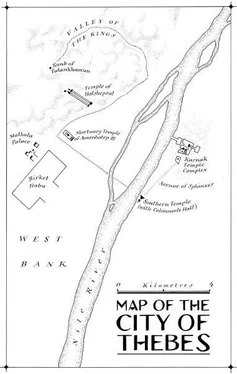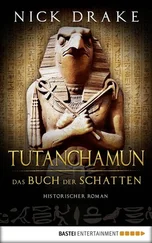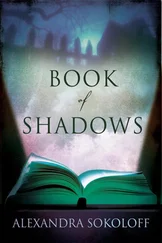Nick Drake - Tutankhamun - The Book of Shadows
Здесь есть возможность читать онлайн «Nick Drake - Tutankhamun - The Book of Shadows» весь текст электронной книги совершенно бесплатно (целиком полную версию без сокращений). В некоторых случаях можно слушать аудио, скачать через торрент в формате fb2 и присутствует краткое содержание. Жанр: Исторический детектив, на английском языке. Описание произведения, (предисловие) а так же отзывы посетителей доступны на портале библиотеки ЛибКат.
- Название:Tutankhamun: The Book of Shadows
- Автор:
- Жанр:
- Год:неизвестен
- ISBN:нет данных
- Рейтинг книги:4 / 5. Голосов: 1
-
Избранное:Добавить в избранное
- Отзывы:
-
Ваша оценка:
- 80
- 1
- 2
- 3
- 4
- 5
Tutankhamun: The Book of Shadows: краткое содержание, описание и аннотация
Предлагаем к чтению аннотацию, описание, краткое содержание или предисловие (зависит от того, что написал сам автор книги «Tutankhamun: The Book of Shadows»). Если вы не нашли необходимую информацию о книге — напишите в комментариях, мы постараемся отыскать её.
Tutankhamun: The Book of Shadows — читать онлайн бесплатно полную книгу (весь текст) целиком
Ниже представлен текст книги, разбитый по страницам. Система сохранения места последней прочитанной страницы, позволяет с удобством читать онлайн бесплатно книгу «Tutankhamun: The Book of Shadows», без необходимости каждый раз заново искать на чём Вы остановились. Поставьте закладку, и сможете в любой момент перейти на страницу, на которой закончили чтение.
Интервал:
Закладка:
She dared to look proud of herself for a moment.
‘I am sure you realize what is at stake,’ I said, cautiously. ‘Even if you manage to proclaim the King’s accession to power, Ay will almost certainly still hold the reins of its management. He controls many powerful factions and forces.’
‘Ay’s ruthlessness is notorious. But we are not without allies, and he is not without great enemies. And then there is his obsessive love of order. He would rather cut himself in half than risk a renewal of disorder in the world.’
‘I think he would always choose to cut a thousand others in half before himself.’
She smiled, for the first time.
‘Ay is more concerned with others who threaten his supremacy. Horemheb, the general, is waiting for his chance. Everyone is aware of this. And remember, we have one other great advantage over Ay. Perhaps the greatest advantage of all…’
‘And what is that?’
‘Time itself. Ay is old. His bones hurt. His teeth hurt. Time the destroyer has discovered him, and is taking his revenge. But we are young. Time is our ally.’
She sat there in all the simple beauty of her youth, dressed in the gold of the God of the Sun, smiling at the thought.
‘But time is also famously a betrayer. It has us all at its mercy.’
She nodded.
‘You are wise to say so. But our time is now. We must seize this moment, for our sakes, and for the sake of the Two Lands. If we do not, then I foresee an age of darkness ahead of us all.’
‘May I ask one last question?’
She smiled.
‘I heard you like questions. I see it is true.’
‘When will Tutankhamun announce his coronation?’
‘It will happen in the next few days. The ceremonial opening of the new Colonnade Hall has been rearranged. At that time the King will enter the innermost shrine. It is the most propitious moment for change.’
How clever and quick she was. The King would visit the Gods. An announcement after such an event would be perfect timing. It would carry the authority of the divine sanction. I felt a stirring of excitement, of the possibility of change-something I had not felt for a very long time. Perhaps this could work. But I knew my optimism was dangerous, and could betray me into carelessness; for now, we remained in the world of shadows.
‘You said you had something to show me.’
7
It was a small carving of Akhenaten and Nefertiti, together with their older daughters, worshipping the Aten, the sun disc, which had been the great symbol of their revolution. Many rays of light extended down from the disc itself, ending in divine hands which offered ankhs, the sacred symbol of life itself, to the strange little human figures whose arms were raised to receive the divine blessings. Despite the fluid, strange elongations of their limbs, done in the style of the period, it was recognizably a family portrait. The stone was not very old, for it had not been roughened or eroded around its edges by wind and time. It could only be from the city of Akhetaten.
There were several other striking things about it. First, the signs of the name of the Aten had been chiselled out. This was significant, for names are powers, and this desecration was intended as a threat to the soul of Ra himself. Second, the disc of the Sun, the great circle, the sign of life, had also been obliterated. But neither of these things was unexpected, for since the abolishment of the religion, such iconoclasm was common. What mattered more was that the eyes and the noses of all the royal family had been gouged out, so that they would have neither sight nor smell in the Otherworld. And I saw too that Ankhesenamun’s own royal names had been excised. This was a very personal desecration.
The carving had been discovered in a box earlier that day, within the royal quarters, during the hours of the performance of the festival. It bore a label offering the contents as a gift to the King and Queen. No one recalled its arrival, and there was no record of its presentation at the gate to the royal offices. It just seemed to have appeared from nowhere. The presentation box itself was unremarkable-a carved chest, probably made of acacia wood, of Theban design and craftsmanship. I rummaged through the straw in which it had been packed. No note. No message. The desecrated carving was the message. It would have taken some effort to acquire it, for Akhetaten, the City of the Horizon, although not entirely deserted, was slowly returning to the dust of its making, and almost no one went there any more. It had the reputation of a cursed and abandoned place now. Together with Khay, we stood pondering this enigmatic object.
‘And you think this stone is connected to what happened today at the temple, and that between them they constitute a threat against your lives?’ I asked.
‘Each event by itself would be considered alarming. But both in one day…’ she replied.
‘What happened today, and the appearance of this stone, are not necessarily connected,’ I said.
‘How can you be sure?’ said Ankhesenamun quickly.
‘The public event was a consciously political act of dissent. But this is more personal, and private.’
‘That sounds a bit vague,’ said Khay, airily.
‘The first was a crude gesture made by a group who had no other means by which to express their opposition and anger. They had no other way to approach the powers that be than to throw something at the King during a ceremony. For all the drama of its effect, that is hardly the action of powerful people. They are outsiders, without real influence, on the margins of society. This is different: it is more potent, more meaningful, and more sophisticated. It implies knowledge of writing, and of the power of names, and of the effect of iconoclasm. It has needed considerable preparation, as well as inside knowledge of the security of the royal quarters. Therefore we can assume this act has been committed by a member of the elite, and probably by someone within the hierarchies.’
‘What are you implying?’ said Khay, stiffly.
‘That it was delivered from within the palace.’
‘That is quite impossible. The royal quarters are carefully guarded at all times.’
‘And yet here it is,’ I said.
His narrow chin was raised now. He bristled with righteous indignation, like an angry bird. But before he could interrupt, I continued: ‘Also the perpetrator is very sure of what he is doing, for this has the intention of creating fear where it does the most damage. In the mind of the King, and those close to him.’
They both stared at me, disconcerted. I had probably said too much, by imputing to the King any kind of human weakness. But it was too late now for protocol and correctness.
‘…Or so the culprit would seem to hope. Can I assume no one knows anything of this?’
Khay looked as if he had eaten a sour fruit.
‘Ay has been informed. He requires to be informed of everything that happens within the royal quarters.’
No one spoke for a moment.
‘You will know what I am going to ask you,’ Ankhesenamun said, quietly.
I nodded.
‘You wish me to find out who is responsible for sending this object, and for its hostile desecration.’
‘Someone malicious has access to the royal quarters. They must be discovered. But we need more than that: I want you also to attend my husband and me as our-private protector. Our guardian. Someone to watch over us. Someone unseen by others…’
‘You have the Palace Guard,’ I said.
‘I cannot trust the Palace Guard.’
Each sentence of this conversation felt as if it was leading me deeper and deeper into a trap.
‘I am one man.’
‘You are the only man. And that is why I have called for you.’
Читать дальшеИнтервал:
Закладка:
Похожие книги на «Tutankhamun: The Book of Shadows»
Представляем Вашему вниманию похожие книги на «Tutankhamun: The Book of Shadows» списком для выбора. Мы отобрали схожую по названию и смыслу литературу в надежде предоставить читателям больше вариантов отыскать новые, интересные, ещё непрочитанные произведения.
Обсуждение, отзывы о книге «Tutankhamun: The Book of Shadows» и просто собственные мнения читателей. Оставьте ваши комментарии, напишите, что Вы думаете о произведении, его смысле или главных героях. Укажите что конкретно понравилось, а что нет, и почему Вы так считаете.











